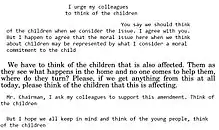Pensez aux enfants
« Pensez aux enfants » (en anglais : « think of the children ») est un cliché qui a évolué en tactique rhétorique[1] - [2] - [3]. Il se réfère littéralement aux droits de l'enfant (dans la discussion du travail des enfants)[4] - [5] - [6] mais est souvent utilisé lors d'un débat comme un argumentum ad misericordiam. Il s'agit d'un argument logique fallacieux[1] - [2] - [3].

Dans leur livre Art, Argument, and Advocacy (2002), John Meany et Kate Shuster soutiennent que cette expression, employée dans un débat, appelle a substituer la raison par l'émotion[1]. L'éthicien Jack Marshall écrit qu'elle doit sa popularité à sa capacité à amener les gens à réfléchir de manière non rationnelle, particulièrement en matière de morale[2]. « Pensez aux enfants » a été invoquée par des partisans de la censure pour, selon eux, protéger les enfants d'un danger[7] - [8]. Dans son livre Community, Space and Online Censorship (2009), Scott Beattie soutient que considérer les enfants de manière excessivement protectrice comme des innocents ayant besoin de protection est une forme d'obsession de la notion de pureté[7]. Un article de 2011 paru dans le Journal for Cultural Research observe que l'expression est née d'une panique morale[9].
Cette phrase a pu naître en 1964, dans le film Mary Poppins, quand le personnage de Mme Banks demande à la nounou de ne pas partir et de « penser aux enfants ! »[10]. L'expression a surtout été popularisée en 1996 dans la série télévisée Les Simpson[11] - [12] où le personnage d'Helen Lovejoy demande, au cours d'un débat animé par des citoyens de la ville fictive de Springfield, « quelqu'un va-t-il penser aux enfants ? »[13] - [14] - [15] - [16] - [17].
Par la suite, son utilisation en société a souvent été moquée[8], étant même parfois nommée « loi de Lovejoy »[15].
Références
- (en) Cet article est partiellement ou en totalité issu de l’article de Wikipédia en anglais intitulé « Think of the children » (voir la liste des auteurs).
- (en) John Meany et Kate Shuster, Art, Argument, and Advocacy : Mastering Parliamentary Debate, New York, International Debate Education Association, , 382 p. (ISBN 978-0-9702130-7-5, OCLC 438996525, lire en ligne), p. 65.
- (en) Jack Marshall, « 'Think of the Children!': An Ethics Fallacy », Ethics Scoreboard, Alexandria, Virginie, ProEthics, Ltd., (lire en ligne [archive du ], consulté le )
- (en) Margie Borschke, « Rethinking the rhetoric of remix », Media International Australia incorporating Culture and Policy, University of Queensland, School of Journalism and Communication, vol. 141, , p. 17
- (en) National Child Labor Committee (en), « Mr. Coal's Story », The Child Labor Bulletin, Manhattan, New York, vol. 3, no 2, , p. 39, 73 (ISSN 0360-0823, OCLC 612770438)
- (en) Sara Boyce, « Northern Ireland's Bill of Rights: A Children's Rights Perspective », Children's Legal Centre, no 183, (ISSN 0265-1459, OCLC 749128561)
- (en) Bruce D. Perry, Children's Rights and Human Development, Intersentia, coll. « Maastricht Series in Human Rights », (ISBN 978-94-000-0032-2), p. 498
- (en) Scott Beattie, Community, Space and Online Censorship : regulating pornotopia, Farnham, Ashgate, (ISBN 978-0-7546-7308-8), p. 165–167
- (en) Edward Keenan, « Thinking of the children is no laughing matter », The Toronto Star, , GT4
- (en) Debra Ferreday, Hope and Feminist Theory, Routledge, (ISBN 978-0-415-61852-6), « Reading Disorders: Online Suicide and the Death of Hope », p. 99
- (en) Kathryn A. Laity, The Cinema of Terry Gilliam : It's a Mad World, Wallflower Press, coll. « Directors' Cuts », (ISBN 978-0-231-16534-1), « Chapter Nine: 'Won't somebody please think of the children?' The case for Terry Gilliam's Tideland », p. 118–119, 128
- J'y suis, j'y reste [Épisode de série télévisée] () 20th Century Fox. La scène se produit à 4:23; 5:51; 6:21. “Think of the children!”
- (en) Commentaires du DVD de la saison 7 des Simpson pour l'épisode J'y suis, j'y reste' [DVD], Cohen, David; Matt Groening; Bill Oakley () 20th Century Fox.
- (en) Charles J. Ten Brink, « Gayborhoods: Intersections of Land Use Regulation, Sexual Minorities, and the Creative Class », Georgia State University Law Review, Georgia State University, vol. 28, , p. 789
- (en) Mikaela Shotwell, « Won't Somebody Please Think of the Children?! », The Journal of Gender, Race & Justice, Iowa City, Iowa, University of Iowa, vol. 15, , p. 141 :
« The Simpsons character Helen Lovejoy popularized this phrase. »
- (en) Edward Keenan, « 'Won't somebody please think of the children!'; The Simpsons has taught us not to trust anyone who stoops to use the corruptibility of children to advance a political argument », The Toronto Star, , IN2
- (en) Jeremy Patrick, « Don't forget, GLBT people have children, too », Lincoln Journal Star, Nebraska, , B5
- (en) Heidi Kitrosser, « Symposium: Presidential Influence Over Administrative Action: Scientific Integrity: The Perils and Promise of White House Administration », Fordham Law Review, Fordham University School of Law, vol. 79, , p. 2395
Voir aussi
Articles connexes
Bibliographie
- Jean-Paul Guedj, « Pense aux enfants », dans Petit décodeur des phrases toxiques... qui nous plombent le moral, Larousse, , 144 p. (ISBN 2-03-590551-6 et 978-2-03-590551-2, lire en ligne), p. 89